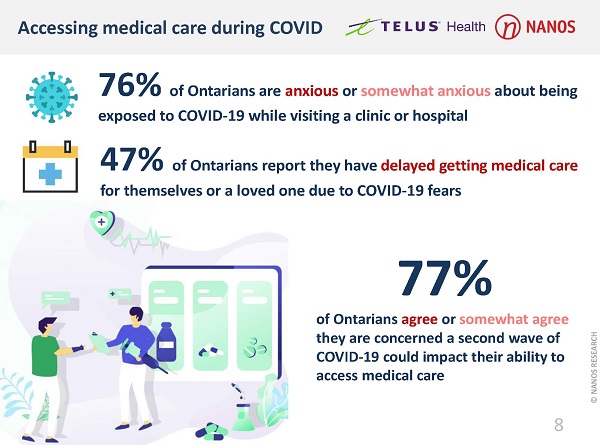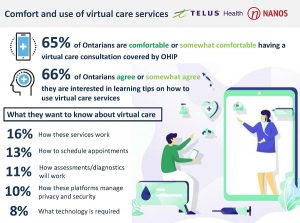
TORONTO — Although Ontario residents more often say they prefer to have medical appointments in-person or by phone call, rather than consulting with a doctor virtually, 65% of Ontarians report they are comfortable or somewhat comfortable having a virtual care consultation through a third-party service covered by the Ontario Health Insurance Plan (OHIP).
That’s according to a new virtual care survey conducted by Nanos Research on behalf of Telus Health, which has become a primary virtual care supplier. Part of the aim of the survey was to gauge how the Covid-19 pandemic has affected Ontario residents’ use of medical care services since March.
According to the survey, given a choice, 34% of Ontario residents say they prefer in-person medical appointments, followed by 32% who say they would opt for a phone call and 20% saying their preference is a video chat.
But when the survey respondents were asked if they are comfortable with having a virtual consultation via an OHIP-covered service offered by a third party, 23% said they were comfortable and 42% said they were somewhat comfortable with the idea, reads the release. Those respondents who reported they needed care for themselves since March were more likely to say they are comfortable (36%) than those who did not need medical care for themselves or a loved one since March (16%).
As part of the survey, Nanos asked respondents about their anxiety level regarding fear of being exposed to Covid-19 by visiting a clinic or hospital since the pandemic began in March. The majority of Ontario residents say since March they have been anxious (29%) or somewhat anxious (47%) about exposure to Covid-19 when visiting or considering visiting a clinic or hospital.
Almost one-half of Ontario residents reported they have delayed getting medical care for themselves or a loved one due to fears about Covid-19. Furthermore, a strong majority of survey respondents agree (34%) or somewhat agree (43%) they are concerned a second Covid-19 wave would impact their ability to access medical care.
A majority of Ontario residents agree (19%) or somewhat agree (38%) they are likely to use an OHIP-covered virtual care service offered by a third party even after the Covid-19 pandemic is over, according to the survey.
When asked if they are interested in learning tips on how to use virtual care services, 24% said they agreed and 42% said they somewhat agreed they are interested. Asked what aspects of virtual care they would like to learn more about, Ontario residents more often say nothing (19%), followed by how these services work (16%), how to schedule appointments (13%), how assessments/diagnostics will work (11%), how privacy and security are managed (10%) and what technology is required (8%).
For the study, Nanos conducted a representative online survey of 502 residents of Ontario between July 8 to 10, 2020. The research was commissioned by Telus Health.




